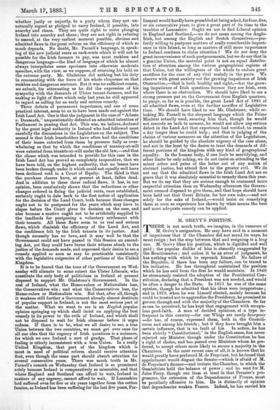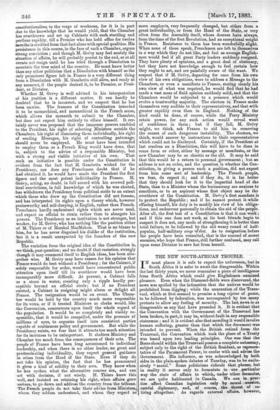M. GREVY'S POSITION.
THERE is not much truth, we imagine, in the rumours of M. Gr6vy's resignation. He may have said in a moment of impatience that if the Chamber did not mend its ways, he
must resign ; but the step between that and resigning is a long one. M. Grevy likes his position, which is dignified and well paid ; the popular dislike of him is absurdly exaggerated by
the Reactionaries ; and unless it be an error of judgment, he has nothing with which to reproach himself. No failure of the Republic, if there has been any failure, can be traced to his initiative. He has throughout maintained the position which he has said from the first he would maintain. In 1848 he strenuously resisted the adoption of the Presidential Con- stitution, declaring that a President was not needed, and would be often a danger to the State. In 1875 he was of the same opinion, though he admitted that his ideas were inopportune ; and in 1879, when he was himself elected, mainly because he could be trusted not to aggrandise the Presidency, he promised to govern through and with the majority of the Chambers. So far as can be perceived, he has kept that engagement with scrupu- lous good-faith. A man of decided opinions, of a type in- frequent in this country—for our Whigs are rarely bourgeois —he has, of course, expressed them, both in the Council- room and among his friends ; but if they have brought him a certain influence, that is no fault of his. In action, he has been strictly "Constitutional," in the English sense, has never rejected any Minister, though under the Constitution he has a right of choice, and has passed over Ministers whom he pre- ferred, to accept others more likely to secure a majority in the Chambers. In the most recent case of all, it is known that he would greatly have preferred M. de Freyeinet, but he found that appointment would disgust the Senate—which is afraid of M. de Freycinet's finance—and irritate the Chamber, in which the Gambettists hold the balance of power ; and he sent for M. Jules Ferry, though one item at least in that Premier's pro- gramme, the extension of the Dependencies of France, must be peculiarly offensive to him. He is distinctly of opinion that dependencies weaken France. Indeed, he has carried his
constitutionalism to the verge of weakness for it is in part due to the knowledge that he would yield, that the Chamber has overthrown and set up Cabinets with such startling and perilous rapidity, till a Premier who has held office for twelve months is credited from that fact alone with special qualities. His persistence in this course, in the face of such a Chamber, argues strong conviction ; and though M. Grevy may feel acutely the situation of affairs, he will probably persist to the end, or at all events not resign until he has tried through a Dissolution to ascertain the true mind of the country. He must know better than any other politician that a Dissolution with himself as the only prominent figure left in France is a very different thing from a Dissolution with M. Gambetta still alive, and ready at any moment, if the people desired it, to be Premier, or Presi- dent, or Dictator.
Whether M. Grevy is well advised in his interpretation of his position is a different matter. It can hardly be doubted that he is incorrect, and we suspect that he has been unwise. The framers of the Constitution intended it to be monarchical, and monarchical in the French sense, which allows the monarch to submit to the Chamber, but does not expect him entirely to efface himself. It cer- tainly never was proposed that the immense powers confided to the President, his right of selecting Ministers outside the Chambers, his right of dismissing them individually, his right of sending Messages, his right of controlling patronage, should never be employed. He must have been intended to employ them as a French King would have done, that is, subject to the advice of a responsible Ministry, but with a strong and visible initiative of his own. That such an initiative is possible under the Constitution is evident from the fact that Al. Gambetta wished for the Presidency, nor does any Frenchman doubt that if he had obtained it, he would have made the President the first Etgare and the most potent individuality in France. Al. Grevy, acting, no doubt, in full accord with his avowed poli- tical convictions, in full knowledge of which he was elected, has withdrawn the Presidency from political strife to an extent which those who drew up the Constitution did not foresee, and has interpreted its rights upon a theory which, however praiseworthy and self-denying, is English, rather than French. Frenchmen hardly understand rights which are never used, and expect an official to strain rather than to abnegate his powers. The Presidency as an institution is not stronger, but weaker, for Al. Grtivy, who has nothing like the position either of M. Thiers or of Marshal MacMahon. That is no blame to him, for he has never disguised his dislike of the institution, but it is a result unexpected by the founders of the new Republic. The variation from the original idea of the Constitution is, we think, past question; and we doubt if that variation, strongly though it may commend itself to English ideas, has been alto- gether wise. M. Grevy may have reason for his opinion that France would do best without a Presidency ; for the Cabinet, if solely responsible for order, would have concentrated public attention upon itself till its overthrow would have been incomparably more difficult. At present, a Cabinet falls as a stone in water, creating only a ripple hardly per- ceptible beyond an official circle; but if no President existed, a Cabinet in resigning might alarm or delight all France. The resignation would be an event. The Cham- ber would be held by the country much more responsible for its votes, or if it treated Ministers as clerks would, like the Convention, concentrate upon itself the whole regard of the population. It would be so completely and visibly re- sponsible, that it would be compelled, under the pressure of millions of eyes, to organise itself into consistent parties capable of continuous policy and government. But while the Presidency exists, we fear that it attracts too much attention for its inertness to be unimportant. It shelters Ministry and Chamber too much from the consequences of their acts. The people of France have been long accustomed to individual leadership, and when there is no other leader, no great and predominating individuality, they expect general guidance in crises from the Head of the State. Even if they do not take his opinion, the fact that he has pronounced it gives a kind of solidity to their own. They know when he has spoken what the alternative courses are, and can act with decision, if not wisely. Al. niers knew this well, and insisted on retaining his right, when affairs grew • serious, to go down and address the country from the tribune.i The French people do not take their advice from Ministers whom they seldom understand, and whom they regard as
mere employes, very frequently changed, but either from a great individuality, or from the Head of the State, or very often from the Assembly itself, whose decrees have always, from the time of the first Revolution, had an exceptional weight in France. Resistance to them has been wonderfully alight. When none of these speak, Frenchmen are left to themselves in a way which they do not like, and feel as average English- men would feel if all great Party leaders suddenly resigned. They have plenty of opinions, and a great deal of obstinacy, but they have not knowledge enough to feel certain how they ought to act, and are painfully aware of the want. We suspect that if Al. Grevy, departing for once from his own view of his own obligations, were to address a Message to the Chambers, or even a manifesto to France, stating clearly his own view of what was required, he would find that he had made a vast mass of fluid opinion suddenly solid, and that the Chambers would be subjected to a pressure which would evolve a trustworthy majority. The electors in France make themselves very audible to their representatives, and that with greater rapidity even than in England. Nothing of the kind could be done, of course, while the Ferry Ministry retain power, for any such action would reveal want of confidence in them ; but if they fall, M. Grevy might, we think, ask France to aid him in removing the causes of such dangerous instability. The electors, we think, would answer by instructions to their representatives which could not be disobeyed. Certainly, if the President at last resolves on a Dissolution, this will have to be done in some form or other, either by message or manifesto, or the new Chamber may be as chaotic as the old. It may be said that this would be a return to personal government ; kut an address is not an order, and the question is whether the Con- stitution, in giving a person such a position, did not expect from him some sort of leadership. The French people, we fear, do expect it ; and if they do, it is far better that they should look for it to the impartial head of the State, than to a Minister whom the bureaucracy are anxious to conciliate, or to an aspirant whose first object may be the overthrow of the Constitution. M. Griivy's first mandate is to protect the Republic ; and if he eannot protect it while effacing himself, his duty is to modify his view of his obliga- tions, and endeavour personally to obtain the aid of the people. After all, the first test of a Constitution is that it can work ; and if this one does not work, as its best friends begin to suspect it does not, any mode of strengthening it is better than total failure, to be followed by the old weary round of half- popular, half-military coup Yritat. As to resignation before the people have been consulted, that is the counsel of secret enemies, who hope that France, still further confused, may call upon some Dictator to save her from herself.



































 Previous page
Previous page